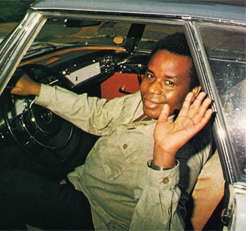|
 Mounk'a, Pamelo (M'Bemba, Yves André "Pablito"), Congolese singer and song writer; born Brazzaville, May 10, 1945; died Brazzaville, Jan. 14, 1996. Mounk'a, Pamelo (M'Bemba, Yves André "Pablito"), Congolese singer and song writer; born Brazzaville, May 10, 1945; died Brazzaville, Jan. 14, 1996.
Brazzaville-born Pamelo quenched his thirst for music in Kinshasa. He loved the sounds of African Jazz, and he made the twenty-minute ferry ride across the Congo River to see them play whenever he could. He had been composing songs in the popular Congolese rumba style, some of which he eventually gave to the band's young new singer Tabu Ley Rochereau. At least one of them, "Paquita," became a hit for the band. Pamelo, then known as "Pablito," was set to join African Jazz himself when the band suddenly split apart.
Back home in Brazzaville he joined Bantous de la Capitale instead. He jumped ship briefly for a turn with Rochereau's African Fiesta before settling in for the long haul with Bantous de la Capitale. There, as Pamelo M'Bemba, he teamed with another promising singer, Kosmos Moutouari, in one of the era's most popular duos. A gifted composer, Pamelo contributed many songs to the band's growing roster of hits, including "Masuwa" (the boat) and "Mama na Mwana" (mother and child), both from the mid-sixties.
Pamelo, Kosmos, and singer Célestin Kouka left Bantous in 1972 to form the Trio CEPAKOS. This group, while popular at home, was little known outside central Africa. Pamelo returned to Bantous in 1978, but the collaboration lasted only three years. In 1981 he flew to Paris to begin a highly successful solo career using the name Pamelo Mounk'a. Recording with session musicians under the auspices of producer Eddy Gustave, he laid the tracks for L'Argent Appelle L'Argent (money attracts money), one of the best albums to come from the newly evolving center of Congolese music production. Several additional albums, including the popular Samantha, followed.
In 1986, Pamelo returned to the fading Bantous, taking the reins as chef d'orchestre. The band enjoyed a brief renaissance until health problems forced Pamelo to relinquish control. He joined a group of deserters from Bantous in 1989 to form Bantous Monument. It proved to be his last musical endeavor.
For nearly twenty years, from the mid-sixties to the mid-eighties, Pamelo's skillful compositions, vibrant tenor, and sexy, youthful good looks attracted an enormous following. His contributions helped Bantous de la Capitale stay in contention with other top Congolese bands like O.K. Jazz and Fiesta National/Afrisa. Working solo he produced some of the best music to come out of the burgeoning Paris scene. The future seemed to promise continued success for Pamelo, until worsening diabetes brought his life to an end.
© 2011 Gary Stewart
SELECT DISCOGRAPHY
Plus Grands Succès de Pamelo Mounk'a (Karac 44430) eighties recordings, including "L'Argent Apelle L'Argent" and "Samantha," reissued 1993.
With Bantous de la Capitale: Pamelo Mounk'a et Les Bantous de la Capitale (vols. 1 & 2, Sonodisc CD79090 & 91) sixties and seventies recordings reissued 1995.
With Bantous Monument: Monument (Sonodisc CDS5506) 1989.
SELECT BIBLIOGRAPHY
A. Badjio, "La Carrière de Pamelo," Bingo (no. 337, Feb. 1981); V. Goldman, "Pamelo Mounk'a Chanteur d'Ambiance," Libération (Jan. 9, 1983); S. Bemba, 50 ans de musique du Congo-Zaire (Paris, 1984); R. Henderson, "A Personal Tribute to the Genius of Congolese Singer Pamelo Mounk'a," The Beat (vol. 13, no. 1, 1994); G. Stewart, "Pamelo Mounk'a," The Beat (vol. 15, no. 2, 1996); G. Stewart, Rumba on the River (London and New York, 2000).
|

